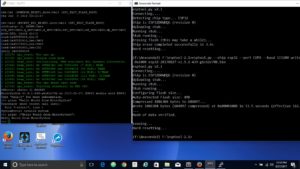ESP32 – Getting started with MicroPython
Micropython is a lean and efficient implementation of the Python 3 programming language that includes a small subset of the Python standard library and is optimised to run on microcontrollers and in constrained environments. ESP32 Wroom supports Micropython. In this blog, we will see how to flash Micropython firmware on ESP 32
Software needed:
ESPTOOL
Putty/Teraterm
Python 3 environment
USB drivers for silicon labs CP2102
Setting up:
- Download EspTool from github site .The version used in this tutorial was v2.1
Unzip the folder and run setup.py to create esptool
(f:\Anaconda3) F:\esptool-2.1>python setup.py install
or you can install it with pip as
pip install esptool2. Download micropython firmware from micropython site for ESP32
3. Connect ESP32 using usb cable. Find the com port number from device manager
4. Erase the current firmware by issuing this command
esptool.py --port COM3 erase_flash
F:\esptool-2.1>esptool.py --chip esp32 --port COM3 --baud 115200 write_flash -z 0x1000 esp32-20170827-v1.9.1-439-g6c62e70b.bin
6. Open serial terminal by giving COM port number and baud rate
Testing
7. Everything is fine, you will see this window.
8. Print(“Hello world”) from the python command prompt to see the result
9. Check Wifi accesspoints available to connect by issuing wifi_scan command
10. Then connect LED on GPIO 23 and issue commands
>>> import machine >>> pin23 = machine.Pin(23, machine.Pin.OUT) >>> pin23.value(1) >>> pin23.value(0) >>> pin23.value(1) >>>
For clarity showing the output of terminal
ets Jun 8 2016 00:22:57
rst:0x1 (POWERON_RESET),boot:0x13 (SPI_FAST_FLASH_BOOT)
ets Jun 8 2016 00:22:57
rst:0x10 (RTCWDT_RTC_RESET),boot:0x13 (SPI_FAST_FLASH_BOOT)
configsip: 0, SPIWP:0xee
clk_drv:0x00,q_drv:0x00,d_drv:0x00,cs0_drv:0x00,hd_drv:0x00,wp_drv:0x00
mode:DIO, clock div:2
load:0x3fff0008,len:8
load:0x3fff0010,len:3408
load:0x40078000,len:9488
load:0x40080000,len:252
entry 0x40080034
I (2227) cpu_start: Pro cpu up.
I (2228) cpu_start: Single core mode
I (2230) heap_init: Initializing. RAM available for dynamic allocation:
I (2266) heap_init: At 3FFAE2A0 len 00001D60 (7 KiB): DRAM
I (2322) heap_init: At 3FFD4FD8 len 0000B028 (44 KiB): DRAM
I (2380) heap_init: At 3FFE0440 len 00003BC0 (14 KiB): D/IRAM
I (2439) heap_init: At 3FFE4350 len 0001BCB0 (111 KiB): D/IRAM
I (2499) heap_init: At 400920A0 len 0000DF60 (55 KiB): IRAM
I (2558) cpu_start: Pro cpu start user code
I (2716) cpu_start: Starting scheduler on PRO CPU.
OSError: [Errno 2] ENOENT
MicroPython v1.9.1-439-g6c62e70b on 2017-08-27; ESP32 module with ESP32
Type "help()" for more information.
>>> print "Hello World from MicroPython"
Traceback (most recent call last):
File "<stdin>", line 1
SyntaxError: invalid syntax
>>> print ("Hello World from MicroPython")
Hello World from MicroPython
>>> import network
I (638039) wifi: wifi firmware version: f092575
I (638039) wifi: config NVS flash: enabled
I (638039) wifi: config nano formating: disabled
I (638039) system_api: Base MAC address is not set, read default base MAC address from BLK0 of EFUSE
I (638049) system_api: Base MAC address is not set, read default base MAC address from BLK0 of EFUSE
I (638069) wifi: Init dynamic tx buffer num: 32
I (638069) wifi: Init dynamic rx buffer num: 64
I (638069) wifi: wifi driver task: 3ffd79a4, prio:23, stack:4096
I (638079) wifi: Init static rx buffer num: 10
I (638079) wifi: Init dynamic rx buffer num: 0
I (638079) wifi: Init rx ampdu len mblock:7
I (638089) wifi: Init lldesc rx ampdu entry mblock:4
I (638089) wifi: wifi power manager task: 0x3ffde454 prio: 21 stack: 2560
I (638099) wifi: wifi timer task: 3ffdf4bc, prio:22, stack:3584
W (638099) phy_init: failed to load RF calibration data (0x1102), falling back to full calibration
I (638259) phy: phy_version: 355.1, 59464c5, Jun 14 2017, 20:25:06, 0, 2
I (638269) wifi: mode : null
>>> sta_if = network.WLAN(network.STA_IF); sta_if.active(True)
I (668049) wifi: mode : sta (30:ae:a4:02:f6:38)
I (668049) wifi: STA_START
True
>>> sta_if.scan()
I (686769) wifi: event 1
[(b'VarshNet', b'T\xb8\nWU,', 7, -37, 2, False), (b'DangerVirus', b'\x1c_+ Sq\x7f', 1, -48, 4, False), (b'Rama', b'\xc0\xff\xd4\x91\xe6\xc6', 6, -86, 3, False), (b'KKS_New', b'\x00\x1f3%\xb0~', 11, -91, 1, False)]
>>> I (638039) wifi: config nano formating: disabled
Few more blogs on MicroPython and ESP32
building IoT application in 10 steps
For ESP32 micro python docs, refer this link





hello and good day
many thanks for the great tutorial _ after having tried some thing – the biest just started to work .
btw: i have in the device folder
device/
boot.py
but no main folder (guess that this will be loaded with my first script)
see the attached image to see that all is woriking now at least regarding this tutorial
https://randomnerdtutorials.com/flash-upload-micropython-firmware-esp32-esp8266/
https://randomnerdtutorials.com/getting-started-micropython-esp32-esp8266/
[attachment=0]running_the_first_script_.jpg[/attachment]
have a great day.
greetings
[b]btw[/b]. where to download the newest v ersion of uPCraft – i have running version 1.0
and besides that: i have mused and thougtht that it wold be a good idea to get other IDEs working with the ESP such as
vscode
thonny
ATOM
PyCharm
but do i need to install the ArduinoIDE too !?
love to hear from you